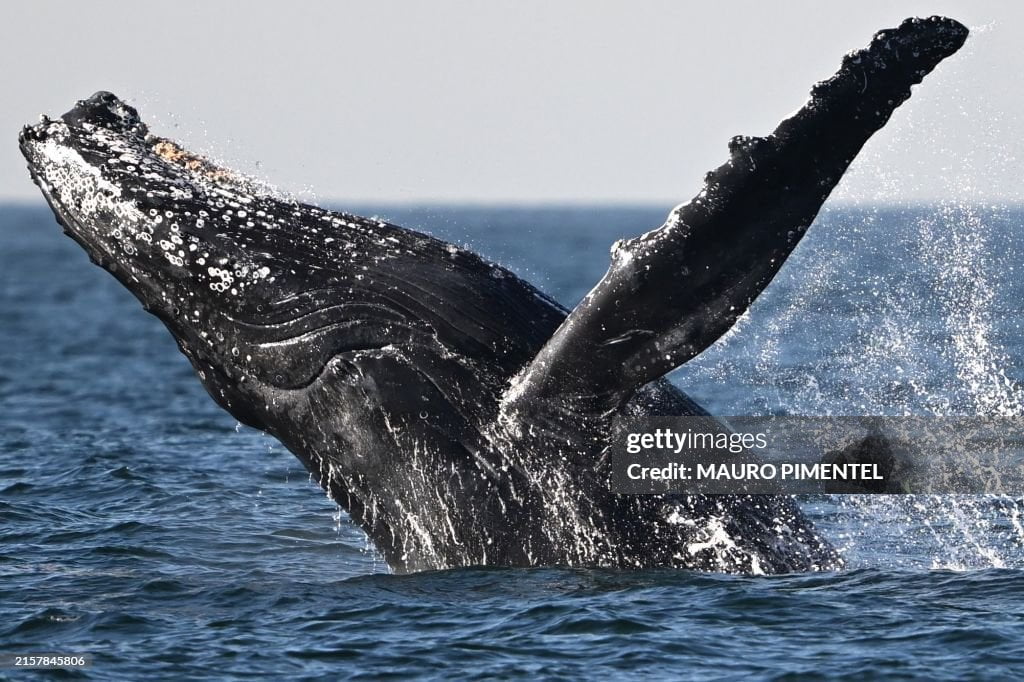What caused a humpback whale to cause a boat to capsize? Here’s the truth about what transpired.
Experts discuss the reasons behind the incident that was featured in a viral video was a mistake due to natural feeding behavior.
By Jason Bittel
Jul 24, 2024 11:28 PM
Experts provide explanations for why the incident in a viral clip was a result of natural feeding habits.
A humpback whale like the one spotted from Cape Cod, Massachusetts, could breach when it swoops in a school of fish.
Photograph By Ethan Daniels / Alamy
When an eight-ton whale weighing humpback takes off from the ocean floor, nothing will stand against it.
Brothers Wyatt and Colin Yager recently witnessed evidence of this near the shores from Odiorne Point in Rye, New Hampshire. They recorded the moment when a humpback swam through the water and landed on the back of a boat that was nearby and sank the boat. The two passengers were tossed into the sea but neither the passengers or the whale appeared to sustain any injuries.
In light of the fact that a number of orcas was recently recorded ramming and destroying vessels near the shores of Iberian Peninsula, the humpback incident has had some thinking that the whales haven’t risen up in protest.
(Why do orcas keep ramming boats? They could be bored teens.)
Alisa Schulman-Janiger is marine biologist and head of the research team for the California Killer Whale Project, assures us that this isn’t the situation. “This was an accident,” she claims. “The whale did not attack the boat.”
This took place in “a collision between a whale 100 percent focused on feeding, and a fishing boat dead in the water (not making any noise),” she claims. “In the video, you can see schooling fish jumping out of the water, and out of the whale’s expanded mouth.”
Humpbacks are prone to breaching.
Humpback whales primarily consume small crustaceans also known as Krill as well as entire fish schools including cod, anchovies, capelin, sand lance. In order to catch fish, marine mammals may also drag their prey up to the surface, releasing bubbles that fool the fish into thinking they’re in a trap and that they have no choice but to swim up.
Then, the humpbacks swoop upwards to the surface and open their mouths and gulp up entire large schools of fish in a single swallow.
In this case, Schulman Janiger states that the humpback at issue was seen feeding on Atlantic menhaden for a few weeks in the Piscataqua River between Maine and New Hampshire. This is a rare occurrence in this region, she writes.
The Coast Guard was apparently aware of the whale, which is the only species with its own kind found in this region and even sent warnings to mariners, so they could be on the lookout for the whale, according to Dianna Schulte the co-founder of and research director at the Blue Ocean Society for Marine Conservation.
In the end Schulman-Janiger believes that the boat owners seem to have done nothing wrong. Their engines were not working and they weren’t trying to communicate with the whale.
In the areas in which baitfish (small species that breed quickly) are abundant, “humpback whales will gladly take advantage of the easy meal and may have little regard for what is on the surface, including boats,” according to an posting on Facebook of the New England/Mid Atlantic department in NOAA Fisheries, “When feeding, humpback whales can be unpredictable and active at the surface.”
How do you ensure your safety in the vicinity of whales
Luckily, being on the surface of a vessel did not stop the humpback from feeding. Schulman-Janiger explains that the reports from the scene suggest that, following the encounter the whale continued feeding for an additional four hours.
However, NOAA advises fishers not to cast lines or troll that are near humpbacks, or where there is obvious bubble nets. If you notice a cloud of bubbles as you’re fishing, NOAA suggests that you remove the lines or equipment cautiously, if you can.
According to NOAA that boats should reduce speed to 10 knots when passing whale hotspots to avoid collisions, giving both the whale and you time to respond.
“A collision with a vessel or entanglement in fishing lines can cause serious injuries to the whale and sometimes be fatal. Collisions with whales have also thrown boaters from vessels and caused serious injuries and even death to people.”










